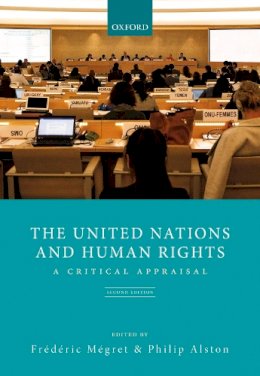
Stock image for illustration purposes only - book cover, edition or condition may vary.
The United Nations and Human Rights. A Critical Appraisal.
Philip; M Gr Alston
€ 221.60
FREE Delivery in Ireland
Description for The United Nations and Human Rights. A Critical Appraisal.
Hardcover. This book analyses the UN's contribution to international human rights, and the desire to ensure that governments are held accountable for their treatment of citizens and others. This book offers a comprehensive and expert analysis and critique of UN instruments and organs, and of the new UN Human Rights Council. Editor(s): Alston, Philip; Megret, Frederic. Num Pages: 800 pages. BIC Classification: JPSN1; JPVH; LAM; LBBR. Category: (P) Professional & Vocational. Dimension: 234 x 156 x 3. .
The very concept of human rights implies governmental accountability. To ensure that governments are indeed held accountable for their treatment of citizens and others the United Nations has established a wide range of mechanisms to monitor compliance, and to seek to prevent as well as respond to violations. The panoply of implementation measures that the UN has taken since 1945 has resulted in a diverse and complex set of institutional arrangements, the effectiveness of which varies widely. Indeed, there is much doubt as to the effectiveness of much of the UN's human rights efforts but also about what direction it should take. Inevitable instances of politicization and the hostile, or at best ambivalent, attitude of most governments, has at times endangered the fragile progress made on the more technical fronts. At the same time, technical efforts cannot dispense with the complex politics of actualizing the promise of human rights at and through the UN. In addition to significant actual and potential problems of duplication, overlapping and inconsistent approaches, there are major problems of under-funding and insufficient expertise. The complexity of these arrangements and the difficulty in evaluating their impact makes a comprehensive guide of the type provided here all the more indispensable. These essays critically examine the functions, procedures, and performance of each of the major UN organs dealing with human rights, including the Security Council and the International Court of Justice as well as the more specialized bodies monitoring the implementation of human rights treaties. Significant attention is devoted to the considerable efforts at reforming the UN's human rights machinery, as illustrated most notably by the creation of the Human Rights Council to replace the Commission on Human Rights. The book also looks at the relationship between the various bodies and the potential for major reforms and restructuring.
Product Details
Publisher
Oxford University Press United Kingdom
Number of pages
800
Format
Hardback
Publication date
2020
Condition
New
Number of Pages
768
Place of Publication
Oxford, United Kingdom
ISBN
9780198298373
SKU
V9780198298373
Shipping Time
Usually ships in 15 to 20 working days
Ref
99-4
About Philip; M Gr Alston
Frédéric Mégret is a Full-Professor and Dawson Fellow at the Faculty of Law of McGill University. He holds a Phd in international law from the Université Panthéon-Sorbonne and the Graduate Institute of International Studies of the University of Geneva. He is a graduate of Sciences Po Paris and the author of many articles on international human rights law, public international law, international criminal law and the laws of war. Philip Alston is an international lawyer whose teaching focuses primarily on human rights law and the law of international organizations. He directs the recently-established NYU Center for Human Rights and Global Justice, part of the Institute for International Law and Justice. He is currently John Norton Pomeroy Professor of Law, NYU School of Law.
Reviews for The United Nations and Human Rights. A Critical Appraisal.
What is clear is that this is a seminal book on a key issue of our times. It has been well worth the wait. We must just hope that if the next edition is nearly 30 years in the coming, it will have a somewhat happier story to tell.
Malcolm Evans, International and Comparative Law Quarterly
Malcolm Evans, International and Comparative Law Quarterly
